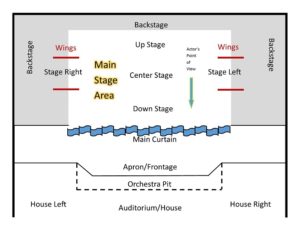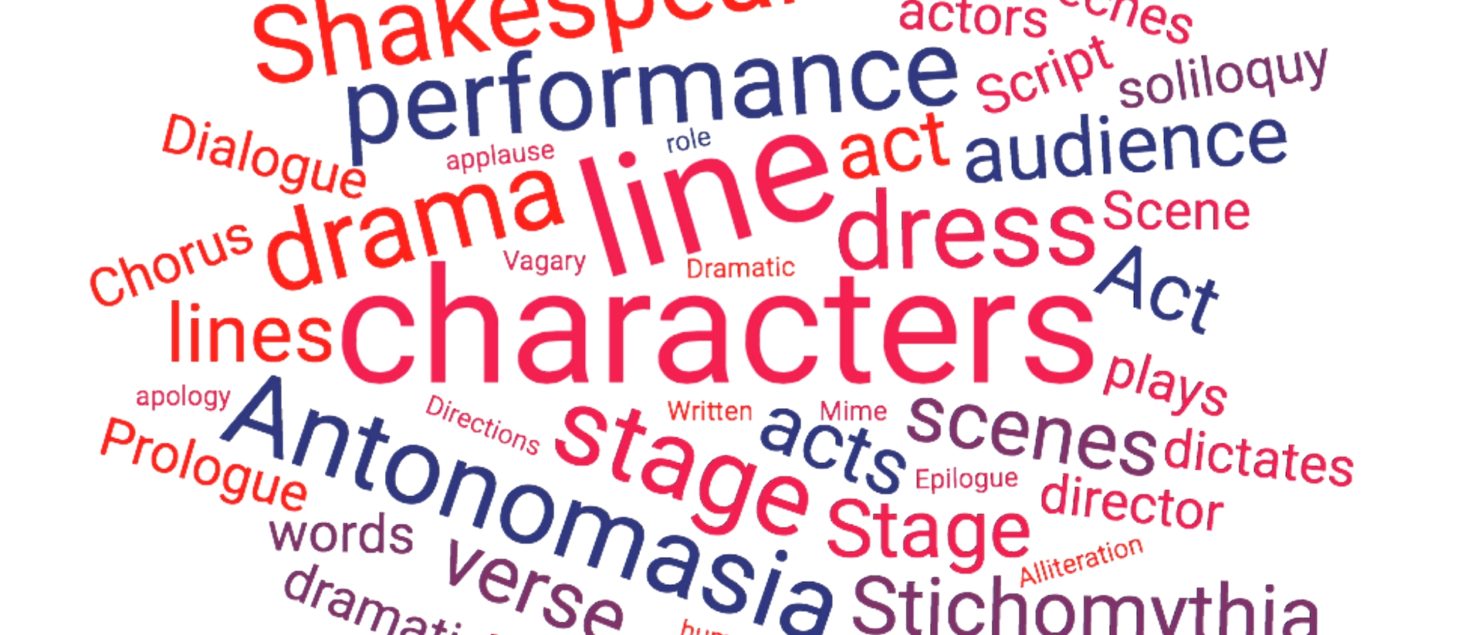Drama vocabulary.
The theatre universe is fascinating, isn’t it?
Especially since it has its own technical terms. We have made a small selection to get back on track and better understand the theatrical environment. Let’s go, let’s walk the memory!
-Piece and theatrical text:
Act: Shakespeare’s plays are usually divided into five acts – which are subdivided into scenes. There was not necessarily any clear division between the acts in a performance.
Scene: The subdivision of an act. There was no marked division between the scenes in an Elisabethan performance.
Antonomasia : It is a literary term in which a descriptive phrase replaces a person’s name. Antonomasia can range from lighthearted nicknames to epic names. Examples : Normal sentence:“Oh, look! Sam’s arrived!” Sentence with Antonomasia: “Oh, look! The great chef has arrived!”
Dialogue: When two or more characters talk with each other.
Script : The written words of a drama.
Monologue: A line spoken by one person.
Stage direction: The kind of dramatic discourse that gives the director and/or actors information relating to the performance of the play. Eg. who is on stage? What does the character do? How is a line delivered? etc. Shakespeare’s stage directions were fairly limited.
Aside: A line spoken to one or more characters which cannot be heard by the remaining characters. An aside can also be addressed to the audience.
Prologue: The introduction to/ presentation of the play. Often given to the audience by the character “Chorus”. Often in verse.
Soliloquy: A line in which a character talks to him-/herself and reveals his or her private thoughts. Convention dictates that other characters on stage cannot hear the soliloquy, but usually the character is alone on stage.
Stichomythia: Stichomythia (Greek: Στιχομυθία) is a technique in verse drama in which sequences of single alternating lines, or half-lines (hemistichomythia) or two-line speeches (distichomythia) are given to alternating characters.
Dramatic Irony: Actions or remarks whose significance is not realised by all the characters.
Stage Directions: Written or spoken advice on how to act a drama.
Vagary: An unexpected and inexplicable change in a situation or in someone’s behaviour.
Epilogue: Usually spoken by a main character at the end of a play, the epilogue concludes the play and is often an apology for the play – or a request for applause.
Mime: Stylised form of movement which create an illusion of reality.
Alliteration: Repetition of consonant sounds. A device related to rhyme. “I am Fortunes fool.”
http://www.wildbilly.dk/engelsk/dramavocabulary.html
– Stage vocabulary :

Auditorium: part of the theater where the audience sits; also known as the “house”.
Backing Flat: a flat which stands behind a window or door in the set.
Clear the stage: everybody off; a direction given to all actors, musicians, and technicians to leave the stage area prior to the beginning of a performance.
Down stage turn: turning so your body passes through the full front position
Flats: muslin or plywood-covered frames used to build the walls of a stage setting.
Fourth wall: the imaginary “wall” between actors on stage and the audience.
Green Room: a room backstage in which the performers can sit and relax before, during, and after a show.
House: where the audience sits.
Platforms: wooden units joined together to build the floors for a stage setting
http://www.pilinutpress.com/Articles/Arts/StageVocabulary.html
Are you ready now? Let’s go to make the quizz:
Discover our latest video on :
How can you control your emotions?
When we are in a situation, we react according to our emotions and sometimes the result is not very glorious?
So how do you regain control?
Here are some explanations to help you:



